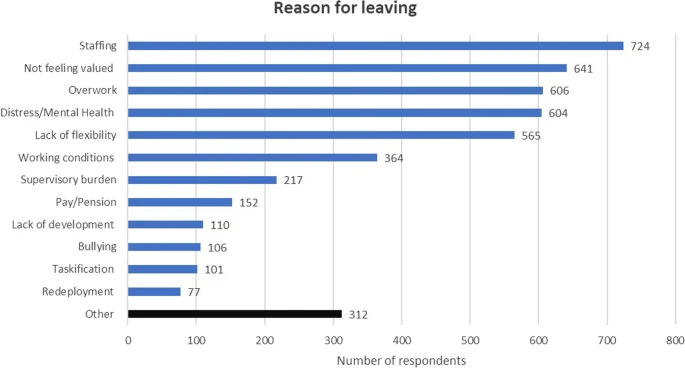Study reveals reasons why nurses are quitting

Poor staffing, feeling undervalued and being overworked are among the top issues driving nurses out of their jobs, a new study suggests.
A high-profile team from London South Bank University, including nursing academics Professor Alison Leary and Dr Elaine Maxwell, have carried out a deep dive into the reasons why health staff quit.
“I was the only nurse on for 60 patients on two wards overnight”
Nurse quoted in study
Also on the study team were nurse Dr Rebecca Myers and healthcare researcher Dr Geoffrey Punshon.
The paper noted how most NHS leaver data categorised reasons into high-level groups such as retirement, resignation, dismissal, redundancy or death.
To go further than this, the researchers examined the additional, free-text answers provided by health workers in some surveys as to why they were quitting.
They found that people were being driven out because the environments in which they were practising were stopping them from achieving the professional standards they aspired to.
Covering a four-year period, between 2019 and 2023, the study analysed reasons for leaving from around 1,900 health staff, the majority of whom were nurses.
The researchers looked beyond the primary reason for leaving, such as resignation, and found 12 underlying issues that were pushing staff out.
The most common reason, cited 724 times, was staffing, or lack of.
One band 5 nurse quoted in the study said: “I was the only nurse on for 60 patients on two wards overnight, the staffing is unsafe, I have resigned.”
Not feeling valued was the second most common reason, given 641 times.
The study noted that there were multiple ways that staff were being undervalued, one of which was organisations failing to recognise the unique contribution of different occupational groups.
“We have to fill in for everyone, ward clerk is off, nurse will do it, housekeeper off, nurse will do it, we are not valued,” said a band 5 nurse.
The issue of “taskification of care” – when staff are given tasks to complete rather than empowered to look after a patient holistically – was also highlighted by 101 professionals.

A graph from the study showing reasons for leaving
A band 7 district nurse (DN) said: “Technology has made the role as DN a more task-orientated role rather than a holistic autonomous role it used to be.
“Tick boxes are now the driving force for quality outcomes, rather than patient-focused, individualised care planning.”
Redeployment – an issue which was rife during the Covid-19 pandemic – was cited 77 times and the study noted how this problem affected nurses in particular.
“I often have to move wards and it causes me to be anxious,” said a band 5 nurse.
Concerns around pay and pension were cited 152 times and related to “the lack of affordability of continuing to do the job”, found the study.
As one band 6 nurse said: “I love what I do, I just can’t afford to do it anymore.”
Other themes found for why staff were leaving included “overwork”, “distress/mental health”, “supervisory burden”, “lack of development” and “bullying”.
The authors determined that “professional practice environments” were as much of a factor in health workers’ decisions to stay or leave a job as their terms and conditions.
They concluded: “Whilst reasons for leaving differ between people, there is a relationship between intrinsic motivation (why they want to do the job) and the conditions in which they try to do the job.
“This study suggests that looking beyond the primary reason for leaving given in the national dataset could identify how the practice environment influences the decision.”
The study – Why are healthcare professionals leaving NHS roles? A secondary analysis of routinely collected data – is published in the journal Human Resources for Health.







